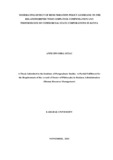MODERATING EFFECT OF REMUNERATION POLICY GUIDELINE ON THE RELATIONSHIP BETWEEN EMPLOYEE COMPENSATION AND PERFORMANCE OF COMMERCIAL STATE CORPORATIONS IN KENYA
Abstract
Commercial state corporations are established by the Government to offer efficient and
effective citizen service delivery, whilst surrendering back investment income at the end
of each financial year. Despite this, most of them have performed dismally over the years.
The question of whether the performance of commercial state corporations in Kenya is
related to the compensation structure of its employees and whether the extent of
implementation of the public service Remuneration policy guideline in commercial state
corporations affects the corporation‘s performance has not received any known scholarly
attention. The main objective of this study was to evaluate the moderating effect of the
Remuneration Policy Guideline on the relationship between employee compensation and
the performance of commercial state corporations in Kenya. The theories applied in this
study are the Equity theory of motivation, principal-agency theory, Dynamic capability
theory, Expectancy theory of motivation and Resource-based view theory. A descriptive
cross-sectional survey research design was used to conduct this study, targeting 612
managers of various cadres in the 68 commercial state corporations in Kenya. The
(Yamane 1967) sampling formula was used to arrive at a sample size of 242 managers in
these corporations. The reliability of the research instrument was done through the
Cronbach Alpha test, and the reliability coefficient of the questionnaire was 0.8045, hence
meeting the threshold value of 0.7. Content, face and construct validity was also tested by
subjecting the data collection instruments to subject matter experts. Data collected
through structured questionnaires was analysed using both descriptive and inferential
statistics. The hypotheses were tested using multiple regression models and Hierarchical
regression for moderation. The results of the hierarchical regression model on all the
variables revealed that employees consolidated pay (β= 0.324, p= 0.000, p<0.05),
employees facilitative allowances (β= 0.077, p= 0.000, p<0.05), employees retirement
benefits (β= 0.132, p= 0.000, p<0.05), employees health benefits (β= 0.138, p= 0.000,
p<0.05) had a significant positive relationship with performance of commercial state
corporations. The augmented model also showed that the Remuneration Policy Guideline
(β= 0.382, p= 0.000, p<0.05) had a positive relationship with the performance of
commercial state corporations. The inclusion of the Remuneration Policy Guideline
improved the variation of the model and explained it by 12.7 per cent (t=7.652, p=0.000),
indicating that the Remuneration Policy Guideline moderates the relationship between
employee compensation and the performance of commercial state corporations in Kenya.
The study concluded that employee compensation affects the performance of commercial
state corporations and that the Remuneration Policy Guideline strengthens the positive
linkage between employee compensation and performance outcomes. These findings
contribute novel insights into the influence of employee compensation on the performance
of commercial state corporations. The study recommended that commercial state
corporations should adopt and integrate the Salaries and Remuneration Commission‘s
Remuneration policy guideline in their remuneration plans, assigning higher priority to
employees consolidated pay, employee‘s facilitative allowances, employee‘s retirement
benefits and employee‘s health benefits since they are crucial in enhancing their
performance

